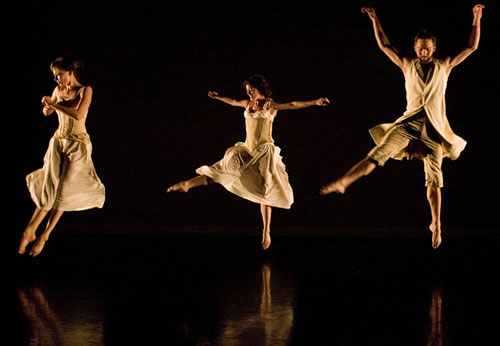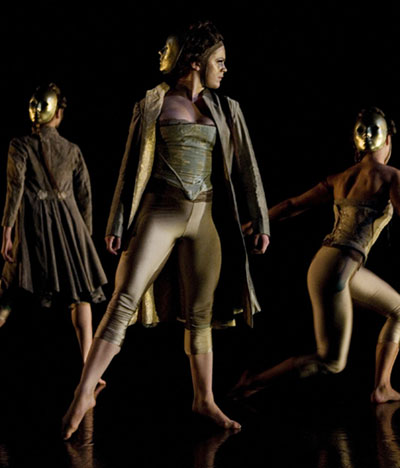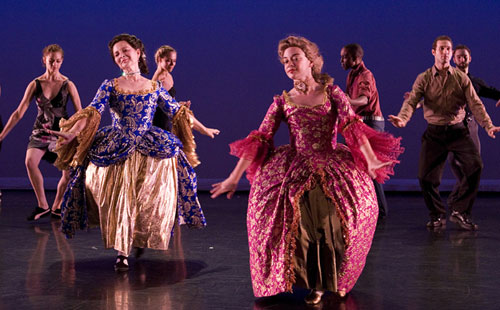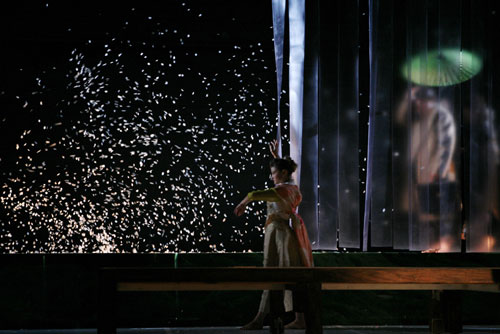This article originally appeared in the Culture section of Bloomberg News on September 28, 2007.
Sept. 28 (Bloomberg) — Everyone who cares about classical ballet eagerly awaits the next great choreographer. But major dance-making talents are few and far between. The “New Ballet” program of chamber-scale pieces unveiled Sept. 27 at Columbia University’s Miller Theater just rammed that point home.
George Steel, the energetic director of the Miller, a performing-arts venue with ambitious and inventive programming, is determined to include dance in the mix.
For the current program of three commissioned dances (the scores aren’t brand new, only contemporary) he has joined forces with a woman equally intent on sponsoring new dance — Mary Sharp Cronson, the founder and producer of Works & Process at the Guggenheim.
The strongest work on the program was the Italian Luca Veggetti’s “Four/Voice,” set to a score by Paolo Aralla. But it earns that accolade largely because it’s as sleekly handsome as a layout in a glossy magazine. Four remarkably strong, attractive dancers, in form-fitting black, white and translucent “second skins,” move against a dark scrim with prophetic messages traveling across it, then before a luminous gray one marked only with a thin white horizontal line close to the floor.
The Armani-cool design elements, in which Veggetti had a hand, emphasize the fact that the relationship of the human figures, especially when they’re partnering violently, seems to be entirely physical, almost architectural.
Suspended Poses
The dancers are at their most beautiful, actually, suspended in poses that seem to be freeze-frames of an ongoing event we might just as well imagine as see.
The ballet has nearly run its handsome but affectless course when the choreographer realizes that dance, even abstract ballet, is drama and something needs to happen. So he has one woman reach out to her guy, awkwardly and tentatively. He almost responds but then, realizing that feeling is a dangerous business, assumes a macho untouchable stance. As the piece ends, she turns away and, still more unsure of herself, approaches the other woman. It’s a story all right, but so predictable and trite it seems unworthy even of the empty gorgeousness that preceded it.
Amanda Miller, an American who founded the Berlin-based Pretty Ugly Dance Company in 1992, used two pieces by Fred Frith for her “dogwood.” The quartet — for two men and two women, one of them mannishly dressed — seems to borrow its brooding mood from Antony Tudor and its long-limbed stretches through space from Merce Cunningham.
Supporting players in this essay on troubled relationships are four straight-backed chairs designed by Seth Tillett. The color of raw wood, they’re carved like intricately edged pieces of a jigsaw puzzle. The dancers circle them warily, then sit in them to carry on mute conversations evoking the impossibility of understanding one another or just to ruminate, hopeless and alone.
Limited in its vocabulary, frustratingly inconclusive in its action, the dance nevertheless hints at a poetic gift in its maker. I’d like to see what she comes up with next.
`Sweet Alchemy’
Alison Chase’s “Sweet Alchemy,” set to selections from John Adams’s intriguingly titled “John’s Book of Alleged Dances,” was the weakest item on view. Chase, a key figure in the genesis of Pilobolus Dance Theater and a longtime participant in that troupe’s collaborative choreography, has a daring imagination spiced by a wicked sense of humor.
This new piece, though, an idyll of sorts for three loving couples, went absolutely nowhere (except, intermittently, to Pilobolusland, where human figures turn themselves into the multilimbed creatures of grotesque fantasy).
The evening’s performers, a majority from the New York City Ballet, were top-notch. The Sirius Quartet and additional soloists delivered their forward-looking scores with brightness and clarity, reinforcing the argument that, without live music, dance is incomplete.
Through Sept. 30 at Miller Theater, Broadway at West 116th Street. Information: +1-212–854-7799; http://www.millertheater.com.
© 2007 Bloomberg L.P. All rights reserved. Reprinted with permission.








